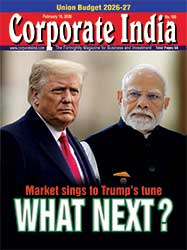Want to Subscribe?
Read Corporate India and add to your Business Intelligence

![]() Unlock Unlimited Access
Unlock Unlimited Access

News
Published: July 9, 2024
Updated: July 9, 2024
Goldman Sachs analysts predict that the upcoming Union Budget on July 23 will emphasize fiscal consolidation rather than minor stimulus measures. With limited fiscal space due to high public debt, the budget is expected to reflect a broad economic agenda aimed at long-term growth, rather than short-term economic boosts.
In their recent note, Goldman Sachs analysts Andrew Tilton, Santanu Sengupta, and Arjun Varma highlight that the government is likely to use the budget to outline its long-term economic policy vision, aligning with India’s development agenda for 2047, marking the centennial of Indian independence. The government aims to stick to the announced fiscal deficit target of 5.1% of GDP for FY25, potentially lowering it further to below 4.5% by FY26.
Despite potential increases in welfare spending, analysts believe there won't be a need to reduce capital expenditure due to higher-than-expected dividend transfers from the Reserve Bank of India (RBI). Changes in income tax policy might result in minimal revenue loss and fiscal impact, maintaining overall fiscal discipline.
The budget is expected to prioritise job creation through labor-intensive manufacturing, credit support for MSMEs, enhancement of services exports, and improving the domestic food supply chain to manage price volatility. These areas are critical for sustaining economic growth and stability.
Goldman Sachs also foresees the budget addressing public finance sustainability and green finance initiatives. Given the Bharatiya Janata Party (BJP) now runs a government without a majority in the Lok Sabha, more political effort will be needed to pass structural reforms, including land and farm sector reforms.
Coalition partners like Andhra Pradesh and Bihar may seek assistance to reduce their debt
burdens, currently at 33% and 36% of state GDP, respectively. However, any allocations
from the central government are expected to be modest, reflecting a careful balancing act
between national and state fiscal responsibilities.
Goldman Sachs anticipates the Modi 3.0 budget will focus on a long-term economic vision,
emphasizing fiscal consolidation and infrastructure development while navigating the political
complexities of a coalition government. The budget aims to set a sustainable path for public
finance, fostering growth and stability for the future.

February 15, 2026 - First Issue

Industry Review

Want to Subscribe?
Read Corporate India and add to your Business Intelligence

![]() Unlock Unlimited Access
Unlock Unlimited Access
Lighter Vein

Popular Stories
Archives
